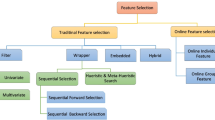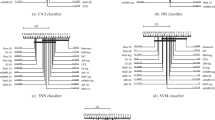Abstract
The exponential rise in advanced software computing, internet technologies, and humongous data has given rise to a new paradigm called BigData, which requires an allied computing environment to ensure 4Vs aspects, often characterized as varieties, volume, velocity, and veracity. In sync with these demands, most of the classical commutating models fail, especially due to large unstructured features of gigantically huge volume. To alleviate this problem, feature selection can be a viable solution; provided it guarantees minimum features with optimal accuracy. In this reference, the proposed work contributed a first of its kind solution which could ensure minimum features while ensuring expected higher accuracy to meet 4V demands. To achieve it, in this paper, a robust Chi-Squared Select-K-Best Incremental Feature Selection (CS-SKB-IFS) model is developed that achieved a minimum set of features yielding the expected accuracy. Subsequently, over the selected features, the CS-SKB-IFS model is used for further classification using the Extra Tree classifier. Thus, the strategic amalgamation of the CS-SKB-IFS model achieved the accuracy of (91.02%), F-Measure (91.20%), and AUC (83.06%) than the other state-of-art methods. In addition to the statistical performance, CS-SKB-IFS exhibited significantly smaller computational time (1.01 s) than the state-of-art method (6.74 s).
Access this chapter
Tax calculation will be finalised at checkout
Purchases are for personal use only
Similar content being viewed by others
References
Chardonnens, T. (2013). Big data analytics on high velocity streams. Journal of Software Engineering Group, University of Fribourg, 50, 1–96.
Alshawish, R. A., Alfagih, S. A., & Musbah, M. S. (2016). Big data applications in smart cities. In IEEE International Conference on Engineering and Management Information Systems (pp. 1–7). IEEE.
Zhang, X., Mei, C. L., Chen, D. G., Yang, Y. Y., & Li, J. H. (2019). Active incremental feature selection using a fuzzy rough set based information entropy. IEEE Transactions on Fuzzy Systems, 28(5), 901–915.
Wang, C. Z., Huang, Y., Shao, M. W., Hu, Q. H., & Chen, D. G. (2019). Feature selection based on neighborhood self-information. IEEE Transactions on Cybernetics, 50(9), 4031–4042.
Saeys, Y., Inza, I., & Larra ñaga, P. (2007). A review of feature selection techniques in bioinformatics. Bioinformatics, Oxford University Press, 23(19), 2507–2517.
Qian, W. B., Shu, W. H., & Zhang, C. S. (2016). Feature selection from the perspective of knowledge granulation in dynamic set-valued information system. Journal of Information Science and Engineering, 32(3), 783–798.
Jing, Y. G., Li, T. R., Huang, J. F., & Zhang, Y. Y. (2016). An incremental attribute reduction approach based on knowledge granularity under the attribute generalization. International Journal of Approximate Reasoning, 76, 80–95.
Javidi M. M., & Eskandari, S. (2018). Streamwise feature selection: A rough set method. International Journal of Machine Learning and Cybernetics, Elsevier, 9(4), 667–676
Liu, J. H., Lin, Y. J., Li, Y. W., Weng, W., & Wu, S, X. (2018). Online multi-label streaming feature selection based on neighborhood rough set. Journal of Pattern Recognition, 84, 273–287.
Zhou, P., Hu, X. G., Li, P. P., & Wu, X. D. (2017). Online feature selection for high dimensional class imbalanced data. Journal of Knowledge Based Systems, 136, 187–199.
Jing, Y. G., Li, T. R., Huang, J. F., Chen, H. M., & Horng, S. J. (2017). A group incremental reduction algorithm with varying data values. International Journal of Intelligent Systems, 32(9), 900–925.
Chen, D. G., Yang, Y. Y., & Dong, Z. (2016). An incremental algorithm for attribute reduction with variable precision rough sets. Journal of Applied Soft Computing, 45, 129–149.
Yang, Y. Y., Chen, D. G., & Wang, H. (2016). Active sample selection based incremental algorithm for attribute reduction with rough sets. IEEE Transactions on Fuzzy Systems, 25(4), 825–838.
Wang, F., Liang, J. Y., & Dang, C. Y. (2013). Attribute reduction for dynamic data sets. Journal of Applied Soft Computing, 13(1), 676–689.
Bahassine, S., Madani, A., Al-Serem, M., & Kissi, M. (2020). Feature selection using an improved chi-square for Arabic text classification. Journal of King Saud University Computer and Information Sciences, 32(2), 225–231.
El-Hasnony, I. M., Barakat, S. I., Elhoseny, M., & Mostafa, R. R. (2020). Improved feature selection model for big data analytics. IEEE Transactions on Knowledge and Data Engineering, 8, 66989–67004.
Kong, L., Qu, W., Yu, J., Zuo, H., Chen, G., Xiong, F., et al. (2019). Distributed feature selection for big data using fuzzy rough sets. IEEE Transactions on Fuzzy Systems, 28(5), 846–857.
Author information
Authors and Affiliations
Corresponding author
Editor information
Editors and Affiliations
Rights and permissions
Copyright information
© 2023 The Author(s), under exclusive license to Springer Nature Singapore Pte Ltd.
About this paper
Cite this paper
Kamble, S., Arunalatha, J.S., Venkataravana Nayak, K., Venugopal, K.R. (2023). Chi-Square Top-K Based Incremental Feature Selection Model for BigData Analytics. In: Noor, A., Saroha, K., Pricop, E., Sen, A., Trivedi, G. (eds) Proceedings of Emerging Trends and Technologies on Intelligent Systems. Advances in Intelligent Systems and Computing, vol 1414. Springer, Singapore. https://doi.org/10.1007/978-981-19-4182-5_11
Download citation
DOI: https://doi.org/10.1007/978-981-19-4182-5_11
Published:
Publisher Name: Springer, Singapore
Print ISBN: 978-981-19-4181-8
Online ISBN: 978-981-19-4182-5
eBook Packages: Intelligent Technologies and RoboticsIntelligent Technologies and Robotics (R0)




